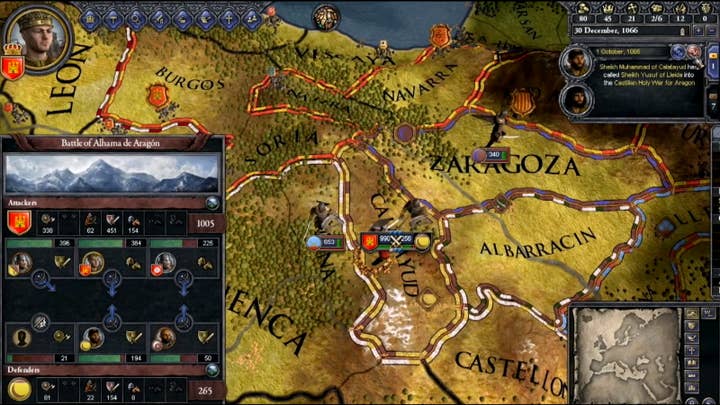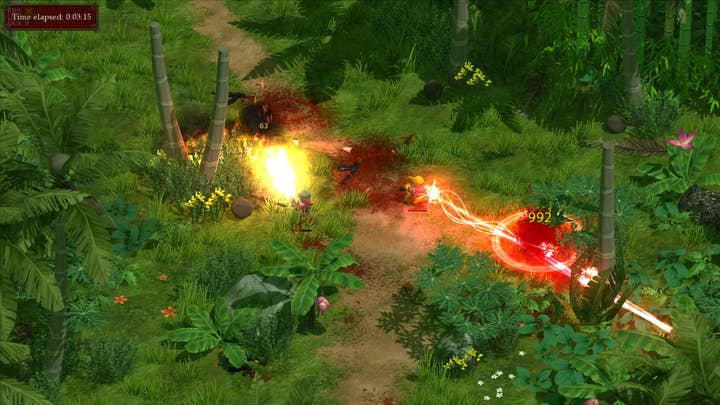The Wester Front: Paradox CEO on life as a niche publisher
"There are so many champions driving people towards playing on PC"
Speaking at GameHorizon last month, Paradox CEO Fredrik Wester earned himself a number of new fans with his plain speaking and positive attitude - telling attendees that there's every chance to build a successful business by hitting a small market comprehensively. In short, do what you love with passion and skill, speak to your audience often and don't try and please everybody. If you're loyal to an audience which feels marginalised by mainstream games, they'll repay you in kind.
Whilst Wester's talk at GameHorizon was extremely well-received, one point he made seemed to cause some consternation. When asked about how to attract new users, Wester suggested that you should stick to the fans that fit your profile, pointing out that as Paradox has a predominantly male audience, it wouldn't be spending much on acquiring female players in the near future. That, surely, wasn't a universally applicable piece of advice?
"No," he exhales, with a wry smile. "As soon as you bring gender into a discussion you're in really dangerous waters - I know that. I received a lot of feedback from that and even as I was saying it I was thinking 'oh my god, I've just said men!' You could just as easily have a game that's played mostly by women. If you want to grow that target audience, it's obviously easier to look for the twins of the people already playing the game - that's what I mean.
"If I have someone with a certain set of interests, a certain education or something - for example the amount of people with a fanatical interest in history playing Europa Universalis is overwhelming. Probably 100 per cent. So to then go outside of that interest group just isn't reasonable. You would probably find people who enjoy the game outside of that group, but it's much harder. Go to the ones you already know will probably like the game.
"All the things that build a community have been actively blocked by console owners. That has to change"
"I don't mean that the games industry should only be targeting just 25-45 year old men - we do that enough already. It's just that happens to be a focus for a lot of our games. Hearts of Iron has something like 95 per cent male players, but if you take Magicka, the amount of female players is much higher. Even if you take Crusader Kings, among grand strategy games it attracts one of the biggest female audiences.
"If you think you can find a certain set of demographics, whatever that is, that plays your game, you should go for that instead of being tempted to grow the market because it will cost you a lot. In terms of marketing and the way you work."
That sort of message naturally tends to resonate with smaller developers - studios who don't have the reach or budget to try and please everyone, all the time. For Paradox, this has meant a focus on core strategy titles - games which even their most ardent of fans will agree can take a great deal of getting used to. Still, these fans are ardent, vocal and engaged - as well as being tremendously attached to a publisher which has been servicing their needs from day one. Paradox has built this following from day one, with the launch of the original Europa Universalis, but is it an option for existing studios looking to change tack?

"I don't think that you have to specialise that early, actually," Wester tells me on a sunny Swedish morning. "I think you can find a way that works for you. I've mentioned what I call the DOTA factor, which means that, if you make a game that's good and someone else takes it and makes it better - or more replayable, more interesting, more e-sport, like they did with DOTA and Warcraft 3. There's potentially a DOTA in every game. You don't need to choose that early, you just need to make sure that you're talking to your target audience, that you're speaking to those people at an early stage in development.
"You can always change a game, that's not a problem. General von Moltke said that not even the best battle plan survives first contact. I quote that a lot. What I mean is that, in the games industry, all the plans that you have, the game that you have in your studio when you call it the gold master, isn't necessarily a finished game out in the market. It hasn't been stress tested. Maybe you test it with a few hundred or a thousand players, but when it's a few hundred thousand people testing it, that's the real test. Then there's fine-tuning and bug fixing and so on, so there's no end to when a game can be balanced - it's up to the player base."
I suggest that this is something of a privileged position. By engaging with a PC audience starved of targeted content Paradox has cornered a market which is responsive, knowledgeable and not afraid to speak its mind. Surely an approach like this would be suicide for a mobile business?
"You can always change a game, that's not a problem. General von Moltke said that not even the best battle plan survives first contact"
"There are a number of mid-tier players in the mobile space already. I was speaking to Chillingo just the other day - they're the perfect example of how you do things really well in the mobile space. They're owned by EA now so maybe they're not the greatest example but mobile shares a lot with the PC. What's missing on console is being able to publish your own titles, being able to update freely. All the things that build a community have been actively blocked by console owners. I think that has to change.
"What they see now is that the PC and mobile spaces are doing well. That's because there's lots of content, it's easy to reach out to the audience, it's easy to update. I don't want to pay €10,000 to release a patch. That's a service that I want to provide to gamers and that's something that should be beneficial to both us and the platform owner.
"The traditional PC market has more competition than ever," he continues. "Tablets have taken a huge chunk of the market, new consoles definitely will. But people play on a lot more platforms than they did five or six years ago. They'll play on three or four platforms. They want to enjoy different game experiences.
"But - until Apple releases its gamepads - you're not going to see the hardcore games being released on iOS. But as soon as they do, and I think and hope it will be very soon, then you're going to start seeing the hardcore fans going towards Apple. No-one really cares what machine you're playing on, that's just nostalgia. You care about the type of game that you're playing. Then you have to think about how you run the game: is it a keyboard, is it a gamepad, is it touchscreen?
"What's holding us back, traditionally, from iOS devices is that we have developed a sufficiently sophisticated touch-screen interface. There's no reason we shouldn't make our games on iOS or Android. They're both good operating systems and the install bases are huge. But when people say that PC is dying and mobile is thriving I think the analysis is wrong, the attack angle is wrong. People want to play a certain type of game. They'll find the platform where they can play that type of game. That platform has to be reasonably priced, though. I've heard $400 dollars mentioned for Xbox One or PS4 and I think that's reasonable. I would pay that. I wouldn't pay $700 when the PS3 came out though - I thought they were joking."

With PCs under attack from mobile and with two new machines on the horizon ready to fight to the death, the market is under fire. It should be shrinking, according to all received wisdom - and with office PC giant HP reporting a disastrous financial year recently, hardware seems to be suffering. But HP is a very different beast from the providers of high-end gaming machines. If PC gaming is in itself a niche, does that mean it's protected from the ravages of a mercurial market?
"It might just be. There are so many champions driving people towards playing on PC - in my opinion iOS and Android lack the sort of champion that is Mojang or Valve - companies which are virtually PC exclusive. That is such a stronghold for the PC market because the hardcore gamers are going to stay where the champions are in the market. We've grown into a small champion. We're not Mojang or Valve but we do have a crowd that will probably follow us to whichever platform we decide to go to."
Nonetheless, loyalty only extends as far as taste, Wester says. Paradox is certainly not ignoring the phenomenal growth of other sectors. "I guess that a lot of our gamers have an iPad or Nexus tablet or whatever," Wester concedes. "They have their PC and smartphone. We just need to find new ways to reach them on these other platforms. People don't have a single platform - gamers are a very tech savvy market."
To that end, Paradox has taken some tentative steps into new business areas, releasing the cross-platform Leviathan Warships in May this year. Considerably less complex than the company's usual output, does Warships represent a change of tack?
"People don't have a single platform - gamers are a very tech savvy market"
"In a way it's an experiment. It's not our first game on iOS - we released a tower defence game on iOS about a year ago called towers of Ardania and Magicka came out on tablet too - and Leviathan is a game that you can play on PC and Mac as well as iOS and Android. So it's a bit of an experiment. We wanted to check how cross-platform play actually works, because I think that's a competitive edge to have over other games.
"Leviathan got a lot of good feedback on that because the tech to develop a cross-platform, multiplayer game is a big challenge - bigger than most people first think. Now we that technology in place I hope we're going to do a lot more games like that. It makes sense to be able to play on PC and continue on your tablet on the bus. The mouse and keyboard interface makes just as much sense when you're using touch controls."
Truly cross-platform technology which doesn't suffer from performance loss is something we've been promised many times in the last few years, but we've seen little evidence that any single solution is yet to fully solve the inherent problems with the concept. Why take on such an obviously thorny problem yourself when there are off the shelf solutions available for less?
"We fully funded the development. The tech is all ours, but it wasn't developed in house - it was developed externally by a company called Pieces Interactive. They've done a great job. Obviously there's a lot of testing going on. Warships itself isn't that advanced - if you just take the mechanics - but the supporting technology is what we really wanted to do something with. Hopefully, our other internal games like Crusader Kings, Europa, Hearts of Iron, are going to playable cross-platform in the same way, but that's still some time away."

